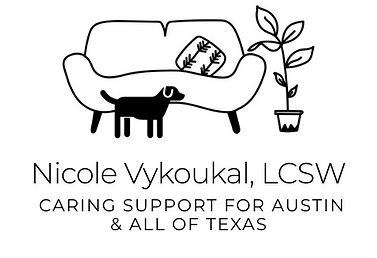4 Ways to Comfort Yourself after the Death of Your Companion Animal
- Nicole Vykoukal, LCSW
- Oct 2, 2024
- 3 min read
Updated: Oct 3, 2024

Your best friend, your furry soulmate, your devoted companion is gone and your heart is broken. Know you’re not alone in struggling with this loss.
Many experts say the death of your companion animal can be especially traumatic because our companions depend on us completely for their care, safety, and medical treatment. We make huge decisions on their behalf. This dependency can create a deep bond, a sense of pressure, and contribute to feelings of guilt and remorse.
Others who have lost their furry soulmate report facing overwhelming grief and sadness, loneliness, confusion, inability to concentrate, loss of focus, loss of appetite, physical ailments, intrusive thoughts and/or images, nightmares, worry, poor quality of sleep, and fatigue. These could all be signs that your sympathetic nervous system is activated.
During times of high stress such as this type of traumatic loss, your sympathetic nervous system activates, releasing stress hormones into your body. This in itself is normal, but can become a problem if our bodies stay in a chronic state of sympathetic nervous system arousal, leading to less than ideal mental, emotional, and physical health.
Finding ways to soothe yourself is important in helping you cope with this loss. Below is a list of 4 tools you can use to help comfort yourself and regulate your nervous system.
These tools will not take all your pain away or completely mend your broken heart. However, practicing any of the tools that resonate with you can help you find moments where you feel a bit more comforted, giving your body a break from a chronic state of stress, and helping you heal physically, emotionally, and mentally.
Hands on Heart and Stomach
Place one hand on your heart center/chest and one hand on your belly, over or near your navel. Be compassionate with yourself as you notice any sensations, thoughts, or emotions that arise. Slowly breathe and use your hands to place gentle, yet firm pressure on your chest and stomach to soothe yourself.
Abdominal Breathing
You can practice belly breathing lying down, sitting, or standing (lying down is usually best because it allows for more expansion of your stomach). Place one or both hands on your stomach. Now, slowly allow your belly to rise, expand, and “inflate” like a balloon as you inhale slowly and deeply through your nose. Exhale slowly and deeply through your mouth as you lower your stomach, and allow your navel to drop towards your spine. Feel your hands rise and fall with your breathing. Complete anywhere from 4-12 of these belly breaths to regulate your nervous system. If you start to feel dizzy, return to your normal breathing pattern.
Weighted Blanket
The deep pressure of a weighted blanket or weighted lap pad can relax, ground, and calm you. If you don’t have a weighted blanket, try a heavy pillow, a heavy blanket (folded yoga blankets/Mexican blankets work well), or a pillow case filled with rice.
Grampa’s Garden (www.grampasgarden.com) is an online store where you can purchase weighted blankets and other therapeutic products.
Sensory Soothing
Identify and engage in sensory input you find calming. This could include the scent of something in nature, the smell of essential oils, a candle, or herbal tea. Some people find the scent of their animal’s collar soothing, others find it too sad. Listen to music, sounds of nature, or running water. See if there is a fabric or stuffed animal you find comforting when you touch it. Be creative and explore what works for you. Finding what is nourishing and comforting to your senses can regulate your nervous system and help you cope with loss.
The tools listed above focus on self-soothing. While grieving, it is also important to engage in social connection and support. Try finding a balance between allowing yourself time to rest and connecting with empathic friends, family, and maybe even a psychotherapist who is trained in bereavement counseling. Being gentle with yourself and allowing time for self-care, self-soothing, and self- compassion can help you make it through the loss of your soulmate.



Comments